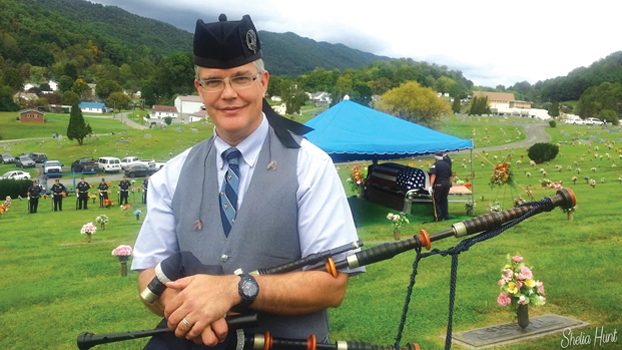Bagpiper Jon Shell will play Sunday at event commemorating100th anniversary of World War I
Published 8:29 am Wednesday, November 7, 2018

- Bagpiper Jon Shell, who has played at numerous graveside services in the area, will will present a concert in downtown Elizabethton Sunday at the Veterans Wall of Honor commemorating the 100th anniversary of the end of World War II. The concert will begin at 1 p.m.
Professional bagpiper Jon Shell of Elizabethton will be participating in Battle’s Over, a commemoration this Sunday marking the 100th anniversary of the end of World War I. Shell will be playing his bagpipes at 3 p.m. at the Wall of Honor in downtown Elizabethton.
His collection of music will include battle hymns, selections from pipers around the world, as well as everyone’s favorite, Amazing Grace.
Organized by Pageantmaster Bruno Peek, Battle’s Over will be celebrated with events throughout not only the United States, but the United Kingdom, Channel Islands, and at scores of other overseas locations, including New Zealand, Ireland, Australia, Bermuda, France, Belgium, Canada, and Germany, just to name a few.
Shell, who has been playing the bagpipes for 42 years said, “We are proud to be playing a part in this historic international event to commemorate the centennial of the end of the Great War, and to recognize the contribution and sacrifice made by the men and women from our own community.
“The Wall of Honor in downtown Elizabethton contains numerous names of men and women who fought in World War I, some of whom gave their all, and I thought this an appropriate place to salute these brave men and women and the war they fought in,” said Shell.
Shell first became interested in playing the bagpipes when as a boy he attended the Highland Games at Grandfather Mountain. He has taken lessons from some of the best, including Pipe Major Sandy Jones. He received private lessons from Jones as well as at the North American Academy of Piping. He also was taught by John MacFayden, Duncan MacFayden, Hamilton Workman, Capt. John A. MacLellan, Ed Krintz, and Roddy MacDonald.
Shell has participated in numerous piping contests and has won numerous awards. He was the first Piper of the Day at both the Orlando and Great Smokey Mountain Highland Games. He won a full piping scholarship to Belhaven University in 1982.
Additionally, he began teaching piping at the North American Academy of Piping and Drumming at age 16 and has taught numerous players throughout the Southeast.
Shell, a teacher at Keenburg School, is in demand for playing at funerals and other events in the area.
“I’ve been blessed to have the opportunity to play at a lot of events, and for that I am thankful,” Shell said.
Around the world, not only will bagpipers acknowledge the commemoration of the end of World War I, so will buglers and churches and cathedrals, which will ring their bells as part of Ringing Out for Peace, which represents 65 societies of ringers from the British Isles and Overseas.
Shell said even though World War I was fought 100 years ago, it had its heroes just as World War II, Korea, and Vietnam and the conflicts that have followed.
“I am privileged to be a part of this worldwide commemoration and even more privileged to play in my hometown, and to honor those veterans,” Shell said.
A total of 49 Carter Countians were killed during World War I. Their names are etched in granite on the Veterans War Memorial downtown and include Charles H. Albertson, Lawrence F. Allen, Henry F. Angel, Fredrick Barlow, Hubert Barron, William S. Blevins, Samuel M. Bowers, Elbert Bowman, Charles E. Cook, John Dayton, Walter Deloach, James R. Geisler, Smith Grindstaff, Lawson J. Hamby, Walter H. Heaton, Roby Hendrix, Fred C. Hicks, Bernie Hilton, Claude Hopson, Edward Ingram, John Ingram, Clarence Johnson, Charles S. Lacey, Orville E. Lewis, Walter Lyons, Joseph R. Main, George H. Markland, Bascom McKinney, Claude McKinney, Edward Miller, Will Miller, Milburn Moffitt, Jessee Nave, Blaine Perkins, Lee Pritchett, Clifton Roark, Charles F. Roe, Robert L. Scott, Fred Shatley, Cecil Smith, Stacy Smith, Blan S. Stout, R.C. Tucker, William W. Ward, Paul Williams, Rothsey E. Williams, Tyler Wilson, William E. Wilson, and Daniel Wright.
World War I began in 1914 after the assassination of Archduke Franz Ferdinand and lasted until 1918. The war pitted Germany, Austria-Hungary and the Ottoman Empire against Great Britain, the United States, France, Russia, Italy and Japan.
Thanks to new military technologies and the horrors of trench warfare, World War I saw unprecedented levels of carnage and destruction. By the time the war was over and the Allied Powers claimed victory, more than 16 million people — soldiers and civilians alike — were dead.
World War I took the lives of more than 9 million soldiers; 21 million more were wounded. Civilian casualties caused indirectly by the war numbered close to 10 million. The two nations most affected were Germany and France, each of which sent some 80 percent of their male populations between the ages of 15 and 49 into battle.
World War I brought about massive social upheaval, as millions of women entered the workforce to support men who went to war, and to replace those who never came back. The first global war also helped to spread one of the world’s deadliest global pandemics, the Spanish flu epidemic of 1918, which killed an estimated 20 to 50 million people.




